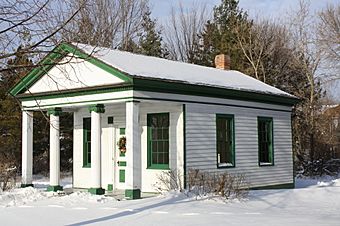Baird Law Office facts for kids
Quick facts for kids |
|
|
Baird Law Office
|
|
 |
|
| Location | Heritage Hill State Park, 2640 South Webster Avenue, Green Bay, Wisconsin |
|---|---|
| Area | 4 acres (1.6 ha) |
| Built | 1831 |
| Architectural style | Greek Revival, Ionic |
| NRHP reference No. | 70000025 |
| Added to NRHP | October 15, 1970 |
The Baird Law Office is a historic building in Green Bay, Wisconsin. It was built in the 1830s. This small building is special because it shows off the Greek Revival style. This style was very popular in America back then. It was one of the first American styles that moved away from British designs.
The building is quite small, only about 16 feet by 30 feet (about 5 by 9 meters). It was originally used as a professional office. Today, you can visit it at Heritage Hill State Park.
Contents
What is the Baird Law Office?
The Baird Law Office is a historic building known for its unique look. It was built in the 1830s. This small, one-story building was first used as an office. It later became a home.
Who Owned This Historic Building?
The building has an interesting history with different owners. A plaque from 1964 says it was built as a law office for Henry S. Baird. He was a very important lawyer in Wisconsin. People even called him the "Father of the Wisconsin Bar."
However, other records say it was first used by Samuel Beall. He used it as a land office and his home. Henry S. Baird bought the building a few years later, in 1841. He was a very important person in the local area and the state.
Why is it Special?
The Baird Law Office is special because of its architecture. It was added to the National Register of Historic Places in 1970. This is a list of places in the United States that are important to history. The building is on a 4-acre area. It is the only historic structure on that land.
The exact year it was built is a bit unclear. Some records say 1831, while others say 1835. The Heritage Hill State Park says Samuel Beall built it in 1835. They say it was at the corner of Main and Monroe Streets in Green Bay.
The building has been moved several times. It finally came to Heritage Hill State Park in Allouez in 1975.
The Greek Revival Style
The Baird Law Office is a great example of Greek Revival architecture. This style was popular in the 1800s. Many Americans liked it because they felt ancient Greece represented democracy.
Nick Backhaus, a restoration supervisor at Heritage Hill, thinks the building survived because of its special look. He said that Greek Revival was often used for much bigger buildings. This makes the small Baird Law Office even more unique.
Architectural Details
The building has several cool architectural features:
- Portico: This is a porch-like entrance with columns. The Baird Law Office has a portico with four columns.
- Columns: The two middle columns are round and have special tops called Ionic capitals. These capitals have a scroll-like design. The two outer columns are square and do not have these special tops.
- Pediment: This is the triangular part above the portico. It has a cedar frieze board. A frieze is a wide band of decoration.
- Dentils: These are small, tooth-like blocks that are often found in rows under the pediment.
Where to Find It Today
The Baird Law Office is now located inside Heritage Hill State Park. This park is home to several other historic buildings. Many of these buildings are also listed on the National Register of Historic Places.



